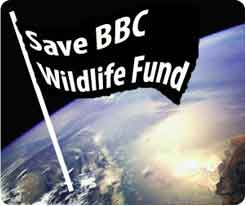
by Rob St John
It looks certain that the BBC intends to close its Wildlife Fund, a charity established in 2007 to gather donations to support the threatened environments made famous by its wildlife documentary films. Since its inception, the Fund has raised nearly £3 million in donations, the entirety of which is used to support 87 global conservation projects. A petition – savebbcwildlifefund.net/ – has been set up in response to the decision, and has gathered 1700+ signatures since 27 July.
It seems slightly short-sighted to close the Fund – all administration costs are currently covered by Gift Aid donations, and the Fund is run on a pro bono basis by BBC Natural History Unit advisors – so it is likely that any savings made cuts are likely to be small. On a cautionary note – likely to be relevant to a broad swathe of similar proposed public service cuts –the BBC Director General Mark Thompson has stated that no further charities similar to the Fund are likely to be created. Such initiatives are so often difficult and time-consuming to create, and all too quickly closed.
To me, the closure of the BBC Wildlife Fund represents the premature end of a model for how the BBC and other wildlife film-making organisations can help support the environments they film through funding conservation initiatives. Wildlife films – from Planet Earth to Springwatch – provide an important, hopeful means for people to engage with the natural world, and the Wildlife Fund provides a clear, innovative means of translating this engagement into tangible, cost-effective support for conservation.
http://www.savebbcwildlifefund.net/